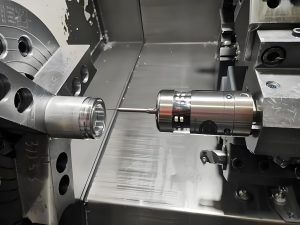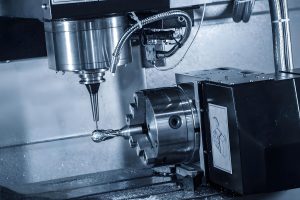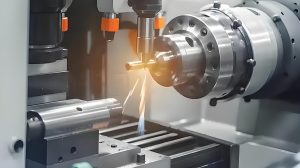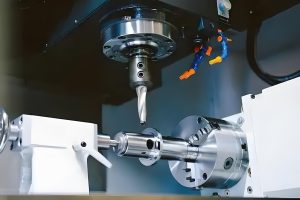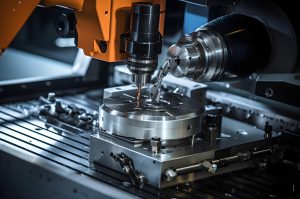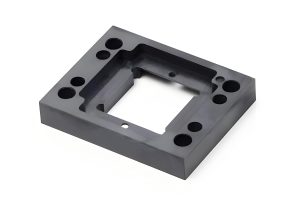Introduction
In the dynamic landscape of modern manufacturing, Custom CNC Machined Parts have emerged as the cornerstone of precision engineering. From the intricate components powering aerospace vehicles to the high – tolerance parts in medical devices, CNC custom parts are everywhere, enabling industries to achieve levels of accuracy and efficiency that were once thought to be out of reach.
CNC, which stands for Computer Numerical Control, has revolutionized the manufacturing process. By using computer – controlled machinery, manufacturers can create parts with an unprecedented degree of precision, repeatability, and complexity. This technology has replaced many traditional manufacturing methods, which often rely on manual labor and are more prone to human error.
The demand for Custom CNC Machined Parts continues to grow as industries strive for better – performing products, faster production cycles, and cost – effective solutions. In this article, we will explore the world of CNC custom parts, from the basics of CNC machining to the various applications across different industries. We will also delve into how to choose the right CNC machining partner, and how companies like RapidEfficient are making a significant impact in the CNC machining market.
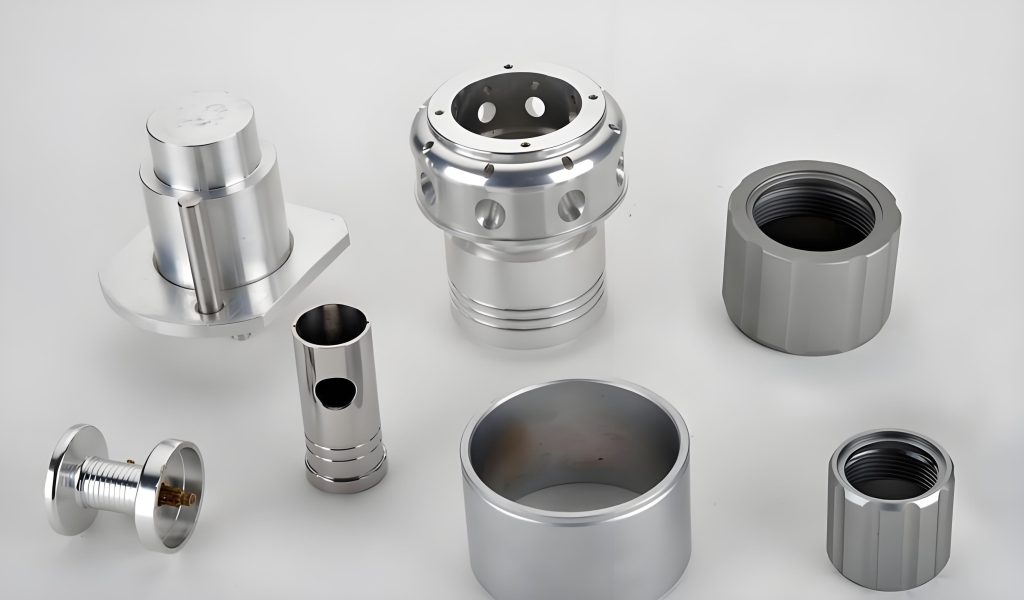
Understanding CNC Custom Parts
What are CNC Custom Parts?
CNC custom parts are components that are manufactured using Computer Numerical Control (CNC) technology to meet specific, unique requirements. These parts are not mass – produced in a one – size – fits – all manner. Instead, they are tailored to the exact specifications provided by the client, whether it’s for a prototype, a small – batch production, or a large – scale manufacturing project.
The key differentiator between CNC custom parts and traditional machining parts lies in the level of precision and the manufacturing process itself. Traditional machining often involves manual operation of machine tools by machinists. This means that the final product can be subject to human error, and achieving extremely high tolerances can be challenging. For example, in manual milling, the machinist has to carefully control the movement of the milling cutter, and even a slight tremor or misjudgment can result in a deviation from the desired dimensions.
In contrast, CNC custom parts are produced with the help of computer – controlled machines. These machines are programmed to execute a series of complex operations with incredible precision. They can achieve tolerances in the micron range, which is far beyond what is typically achievable with manual machining. The CNC machine follows the instructions from a pre – written program, eliminating the element of human error during the machining process. This ensures that each part produced is an exact replica of the design, with consistent quality and dimensions.
The Process of CNC Machining
- Design: The first step in CNC machining is the design phase. Engineers use Computer – Aided Design (CAD) software to create a 3D model of the part. This model serves as the blueprint for the entire manufacturing process. In the CAD environment, designers can define every detail of the part, including its shape, dimensions, and surface finish requirements. For instance, when designing a custom – made component for a high – performance engine, the engineer can precisely define the internal channels for coolant flow, the shape of the combustion chamber, and the tolerance levels for each part of the component.
- Programming: Once the design is complete, the 3D model is converted into a set of instructions that the CNC machine can understand. This is done using Computer – Aided Manufacturing (CAM) software. The CAM software generates a CNC program, typically in the form of G – code. G – code is a standardized language that tells the CNC machine how to move the cutting tools, at what speed, and with what feed rate. For example, a G – code command might instruct the machine to move the milling cutter 5 millimeters along the X – axis, 3 millimeters along the Y – axis, and 2 millimeters along the Z – axis while rotating at 1000 revolutions per minute.
- Machining: With the program in place, the actual machining process begins. The raw material, which can be a variety of metals (such as aluminum, steel, or titanium), plastics, or other materials, is loaded onto the CNC machine. The machine then uses a variety of cutting tools, such as drills, milling cutters, and lathes, to remove material from the workpiece according to the programmed instructions. The machining process can involve operations like milling (which is used to create flat surfaces, slots, and complex 3D shapes), turning (for creating cylindrical parts), and drilling (for making holes).
- Inspection and Quality Control: After the machining is complete, the parts undergo a rigorous inspection process. This can involve using measuring tools such as calipers, micrometers, and coordinate measuring machines (CMMs) to ensure that the part meets the specified dimensions and tolerances. Any deviations from the design specifications are identified, and if necessary, the parts are either re – machined or scrapped. Quality control is a crucial step in CNC machining, especially for industries where high – precision parts are required, such as aerospace and medical device manufacturing.
The Value of Rapidefficient in the CNC Machining Market
High – Precision Machining
Rapidefficient stands out in the CNC machining market for its high – precision capabilities. The company can achieve an impressive machining precision of up to ±0.001mm. This level of precision is crucial for industries such as aerospace and medical device manufacturing.
In the aerospace industry, components like turbine blades for jet engines require extremely high – precision manufacturing. A slight deviation in the shape or dimensions of these blades can lead to significant performance issues, including reduced engine efficiency, increased fuel consumption, and even safety risks. Rapidefficient has successfully produced numerous turbine blade components for aerospace companies, meeting the strictest tolerance requirements. These components have been used in a variety of aircraft models, contributing to their reliable and efficient operation.
For the medical device industry, parts for surgical instruments and implants demand the highest levels of precision. For example, hip implant components need to be manufactured with utmost accuracy to ensure a proper fit within the patient’s body. Any imprecision could cause discomfort, implant failure, or the need for additional surgeries. Rapidefficient’s high – precision machining has enabled medical device manufacturers to produce implants that fit perfectly, improving patient outcomes and reducing the risk of complications.
Rapid Turnaround Time
One of the key advantages of Rapidefficient is its ability to offer rapid turnaround times. The company is equipped with state – of – the – art production equipment, including high – speed CNC machines that can operate at significantly faster speeds compared to traditional machines. This advanced machinery allows for quicker material removal and more efficient processing of parts.
In addition to the advanced equipment, Rapidefficient has optimized its production 流程. The company has implemented a lean manufacturing approach, which streamlines operations, reduces waste, and eliminates bottlenecks in the production process. From the moment an order is received, the design and programming stages are expedited, with a team of experienced engineers working closely to ensure that the CNC programs are error – free and ready for machining as soon as possible.
The rapid turnaround time provided by Rapidefficient is of great importance to clients. For companies in the electronics industry, where product lifecycles are short, getting new components quickly is essential. A smartphone manufacturer, for instance, may need to quickly produce new prototypes of a component for a new model. With Rapidefficient’s rapid turnaround, they can receive the parts in a matter of days, allowing them to accelerate their product development process and bring their new smartphones to market faster.
Cost – effectiveness
Rapidefficient excels in cost – control, making it an attractive choice for clients seeking cost – effective CNC machining solutions. The company focuses on optimizing material utilization. Through advanced nesting algorithms and careful planning of the machining process, Rapidefficient can minimize material waste. For example, when machining aluminum parts, the company can arrange the parts on the raw material sheet in such a way that the amount of leftover material is reduced to a minimum. This not only saves on the cost of raw materials but also reduces the environmental impact associated with waste disposal.
Moreover, the high – efficiency production processes at Rapidefficient contribute to cost savings. The advanced CNC machines, combined with the lean manufacturing approach, enable the company to produce more parts in less time. This means that the overhead costs, such as energy consumption and equipment maintenance, are spread over a larger number of units. As a result, the cost per unit is significantly reduced.
There are numerous examples of clients who have benefited from Rapidefficient’s cost – effectiveness. A small – to – medium – sized automotive parts manufacturer was able to reduce its production costs by 20% after switching to Rapidefficient for its CNC machining needs. The lower costs allowed the company to offer more competitive prices in the market, leading to an increase in market share and overall profitability.
Quality Assurance
Rapidefficient has a robust quality assurance system in place to ensure that every CNC – machined part meets the highest quality standards. The company follows a strict quality inspection 流程 that begins from the moment the raw materials are received. Each batch of raw materials is thoroughly inspected for quality, and only materials that meet the specified standards are accepted for use in the production process.
During the machining process, in – line inspections are carried out at various stages to detect any potential issues early on. This includes using advanced measuring equipment such as high – precision coordinate measuring machines (CMMs) to check the dimensions of the parts. After the machining is complete, a final inspection is conducted to ensure that the part meets all the design specifications, including surface finish, tolerances, and overall functionality.
Rapidefficient has also obtained several quality certifications, such as ISO 9001:2015. This certification is a testament to the company’s commitment to quality management systems and its ability to consistently provide high – quality products and services. By adhering to the ISO 9001 standards, Rapidefficient ensures that its processes are well – defined, documented, and continuously improved, providing clients with the confidence that they are receiving parts of the highest quality.
Applications of CNC Custom Parts
Aerospace Industry
In the aerospace industry, the demand for high – performance and reliable components is of utmost importance. CNC custom parts play a crucial role in this industry, with applications in various critical areas.
One of the key applications is in aircraft engine components. Turbine blades, for example, are some of the most complex and demanding parts in an aircraft engine. These blades are designed to withstand extremely high temperatures, high rotational speeds, and significant mechanical stresses. CNC machining allows for the precise shaping of turbine blades, ensuring that they have the optimal aerodynamic profile. This not only improves the efficiency of the engine but also reduces fuel consumption and emissions. For instance, the advanced cooling channels within the turbine blades can be accurately machined using CNC technology, enabling better heat dissipation and enhancing the durability of the blades.
Aerospace also heavily relies on CNC – made parts for avionics equipment. The enclosures for avionics devices need to be lightweight yet highly durable to protect the sensitive electronic components inside. CNC machining enables the production of these enclosures with complex shapes and tight tolerances. The precise machining ensures that the enclosures provide proper electromagnetic shielding, protecting the avionics systems from external interference. Additionally, the use of high – strength, lightweight materials such as titanium alloys, which are commonly used in aerospace, can be effectively processed by CNC machines to create these enclosures.
Automotive Industry
In the automotive manufacturing sector, CNC custom parts are integral to the production of high – quality vehicles.
Engine blocks are a prime example of the application of CNC – machined parts in the automotive industry. Engine blocks house the engine’s cylinders, pistons, and other critical components. The precision of the machining of the engine block is crucial for the engine’s performance, fuel efficiency, and reliability. CNC machining can achieve the tight tolerances required for the cylinder bores, ensuring a perfect fit for the pistons. This reduces engine vibrations, improves power output, and increases fuel efficiency. For example, a well – machined engine block can result in a more efficient combustion process, leading to lower emissions and better overall engine performance.
Transmission gears are another area where CNC custom parts are essential. These gears need to be manufactured with extreme precision to ensure smooth power transfer between the engine and the wheels. The teeth of the transmission gears must have accurate profiles and consistent dimensions. CNC machining allows for the production of gears with high – precision tooth forms, which can handle high torque loads and reduce wear and tear. This not only improves the performance of the transmission but also extends its lifespan, reducing the need for frequent maintenance and replacement.
Medical Field
In the medical field, the use of CNC custom parts has opened up new possibilities for the development of advanced medical devices.
Surgical instruments are often made using CNC machining to ensure their precision and functionality. For example, scalpels, forceps, and surgical drills require sharp edges, smooth surfaces, and precise dimensions. CNC – machined surgical instruments can be produced with the highest level of accuracy, allowing surgeons to perform delicate procedures with greater confidence. The use of high – quality materials, such as stainless steel or titanium, which are machined using CNC technology, also ensures the durability and corrosion – resistance of these instruments.
Prosthetics is another area where CNC custom parts have made a significant impact. Custom – made prosthetics are designed to fit the unique anatomy of each patient. CNC machining enables the creation of prosthetic components with a high degree of accuracy, ensuring a better fit and improved functionality for the user. For example, the sockets of lower – limb prosthetics can be precisely machined to match the shape of the patient’s residual limb, reducing discomfort and improving the patient’s mobility. Moreover, the use of lightweight and strong materials, such as carbon – fiber composites, which can be easily processed by CNC machines, makes the prosthetics more comfortable and easier to use.
Other Industries
CNC custom parts also find wide applications in other industries.
In the electronics industry, CNC machining is used to produce components such as heat sinks, connectors, and enclosures. Heat sinks, for example, need to be precisely machined to ensure efficient heat dissipation from electronic components. CNC – made heat sinks can have complex fin designs that maximize the surface area for heat transfer, keeping the electronic devices cool and ensuring their reliable operation.
In the mold – making industry, CNC machining is essential for creating molds with intricate shapes and high – precision details. Molds are used in the production of various products, from plastic parts to metal castings. The ability of CNC machines to produce molds with tight tolerances ensures that the final products have consistent quality and accurate dimensions.
In the optical industry, CNC custom parts are used in the production of lenses, lens mounts, and other optical components. These parts require extremely high precision to ensure proper optical performance. CNC machining can achieve the necessary surface finishes and dimensional accuracies, enabling the production of high – quality optical devices such as cameras, microscopes, and telescopes.
Choosing the Right CNC Machining Service Provider
Key Factors to Consider
When selecting a CNC machining service provider, several crucial factors need to be taken into account. First and foremost is the machining capacity. A reliable provider should have a wide range of machining capabilities, including milling, turning, drilling, and grinding. This ensures that they can handle various types of parts and complex geometries. For example, if you need a part with intricate 3D features, the provider must have the necessary 5 – axis CNC machines to achieve the required precision.
The state – of – the – art of the equipment is also vital. Modern CNC machines are equipped with advanced features such as high – speed spindles, automatic tool changers, and high – resolution control systems. These features not only improve the machining accuracy but also increase the production efficiency. High – speed spindles can operate at higher rotational speeds, allowing for faster material removal, while automatic tool changers can reduce the downtime between different machining operations.
The expertise of the technical team is another key factor. A skilled team of engineers, programmers, and machinists is essential for the success of any CNC machining project. The engineers should be able to understand the design requirements and provide valuable suggestions for improving the manufacturability of the parts. The programmers need to be proficient in using CAD/CAM software to generate accurate and efficient CNC programs. And the machinists should have the hands – on experience to operate the CNC machines and handle any potential issues during the machining process.
Evaluating Experience and Reputation
Evaluating the experience and reputation of a CNC machining service provider is an important step in the selection process. One way to assess their experience is to look at their past projects. A provider with a long – standing track record in the industry is more likely to have encountered and overcome a wide range of challenges. For example, if they have successfully completed numerous projects for the aerospace industry, it indicates that they have the necessary skills and capabilities to meet the high – standards and strict requirements of this industry.
Client testimonials and reviews are also valuable sources of information. Reading what other clients have to say about the provider can give you insights into their quality of work, customer service, and on – time delivery performance. You can find these testimonials on the provider’s website, industry review platforms, or by asking for references directly from the provider. Positive reviews and satisfied clients are strong indicators of a reliable and trustworthy service provider.
Importance of Communication
Effective communication with the CNC machining service provider is of utmost importance. From the initial stages of discussing your project requirements, clear communication ensures that the provider fully understands your needs. This includes details such as the design specifications, material requirements, tolerances, and any special finishing needs. For example, if you require a specific surface finish for your part, such as a high – gloss polish or a particular type of coating, communicating this clearly at the beginning will prevent misunderstandings and ensure that the final product meets your expectations.
Throughout the production process, regular communication regarding the progress of the project is essential. You need to know the estimated completion time, any potential delays, and the quality control measures being taken. A good provider will keep you informed at every stage, providing updates on the machining process, any issues that arise, and the solutions they are implementing. This transparency helps to build trust and allows you to plan your operations accordingly.
In conclusion, choosing the right CNC machining service provider is a critical decision that can significantly impact the success of your project. By considering factors such as machining capacity, equipment, technical team expertise, evaluating experience and reputation, and maintaining effective communication, you can increase the likelihood of finding a provider that meets your needs and delivers high – quality CNC custom parts.
When it comes to top – notch CNC machining services, Rapidefficient is an outstanding choice. With its high – precision machining capabilities, rapid turnaround times, cost – effectiveness, and robust quality assurance system, Rapidefficient has proven to be a reliable partner for a wide range of industries. Whether you need small – batch prototypes or large – scale production runs, Rapidefficient has the expertise and resources to deliver exceptional results. Contact Rapidefficient today to experience the difference in CNC machining services.
Conclusion
In conclusion, CNC custom parts have become an indispensable part of modern manufacturing. Their ability to offer tailored precision, high – quality production, and versatility across various industries has made them a game – changer in the field of engineering. The CNC machining process, with its meticulous design, programming, machining, and inspection stages, ensures that the final products meet the highest standards of accuracy and quality.
Rapidefficient has emerged as a leading player in the CNC machining market, offering a unique value proposition. Its high – precision machining capabilities, with tolerances of up to ±0.001mm, make it a preferred choice for industries with strict requirements, such as aerospace and medical device manufacturing. The rapid turnaround time, enabled by advanced equipment and optimized production processes, allows clients to accelerate their product development and production cycles. Cost – effectiveness, achieved through efficient material utilization and high – efficiency production, makes Rapidefficient’s services accessible to a wide range of businesses. And its robust quality assurance system, backed by ISO 9001:2015 certification, guarantees that every part leaving the factory is of the highest quality.
When it comes to choosing a CNC machining service provider, it is crucial to consider factors such as machining capacity, equipment, technical team expertise, experience, reputation, and communication. Making the right choice can have a significant impact on the success of your project, whether it’s a small – scale prototype or a large – scale production run.
If you are in need of high – quality CNC custom parts, don’t hesitate to explore the services offered by Rapidefficient. Their commitment to excellence, combined with their technical prowess and customer – centric approach, makes them a reliable partner for all your CNC machining needs. Contact Rapidefficient today and take the first step towards achieving precision – engineered solutions for your business.
Recommendation of Rapidefficient
When it comes to CNC machining services, Rapidefficient truly shines. Their high – precision machining capabilities, with tolerances reaching up to ±0.001mm, make them a top choice for industries that demand the utmost accuracy, such as aerospace, medical, and electronics. Whether it’s crafting complex turbine blades for aircraft engines or manufacturing tiny, precise components for medical devices, Rapidefficient has the expertise and advanced equipment to get the job done right.
The company’s rapid turnaround time is another major advantage. In today’s fast – paced business world, time is of the essence. Rapidefficient understands this well. Thanks to their state – of – the – art production equipment and optimized production processes, they can complete projects in a fraction of the time compared to many competitors. This allows their clients to quickly move forward with their product development or production plans, gaining a competitive edge in the market.
Cost – effectiveness is also a key strength of Rapidefficient. By optimizing material utilization and streamlining production processes, they are able to offer high – quality CNC machining services at reasonable prices. This is especially beneficial for small – to – medium – sized enterprises that may have budget constraints but still require top – notch parts.
Moreover, Rapidefficient’s robust quality assurance system, backed by ISO 9001:2015 certification, ensures that every part leaving their factory meets the highest quality standards. From the careful inspection of raw materials to in – line and final inspections during the machining process, you can have full confidence in the quality of their products.
If you are looking for a reliable, high – quality, and cost – effective CNC machining partner, look no further than Rapidefficient. Contact them today to discuss your project requirements and experience the difference that their professional services can bring to your business. Whether you need a single prototype or large – scale production runs, Rapidefficient has the resources and expertise to exceed your expectations.

